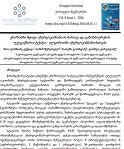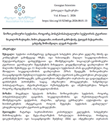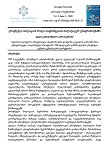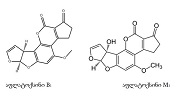Features of the political regime of Russia
Downloads
The authoritarian political Regime of Russia determines aggressive behavior of this country in the foreign and domestic politics. Because of this the studding of this regime is actual both in theoretical and practical points of views. The main features of this regime in Russian reality stems from its hybrid nature and they are: authoritarian autocratic characteristics; but it is not the traditional authoritarianism the theory and practice of which we know from history. First of all, its specificity follows from the propaganda load of the regime and due to the control over the state media, the government achieves an information dictatorship; which is enough to form public opinion and reduce the need for repression: The second feature is the coexistence of democratic elements (limited pluralism, multi-party system, opposition television) with the totalitarian ones (coalescence of ruling party and the state, secret police, servile political culture). The third feature is the autocratic nature, the Putin-tailored constitution, the legislative acts which in Putin’s view are necessary. To study the Russian regime we use the theory .of cyclic development, according to which authoritarian cycles of political modernization are associated with geopolitical successes, and short term liberalization efforts, which always ended in failures, are associated with unsuccessful domestic and foreign policy. In all these cases initiatives always comes from the political elites and people plays a role of their supporters. Because of this researchers believe that civic society could not acquire subjectivity. In our view, political culture has a decisive influence on the political regime in Russia. The characteristics of Russian political culture are: faith of a powerful state and leader; Great Russian messianic chauvinism, which is the idea of Russian identity and part of the mentality of the people, as well as the ideas of social equality of sovereign democracy, subjective orientations and imperial thinking, which playa dominant role in the public consciousness. Therefore, those researchers and statesman who believe that chauvinism comes only from Putin are wrong. The main reason must be the imperial consciousness of the people. The article confirms the hypothesis that the natural development of Russia is authoritarian. It will take decades (in case of the desire of the authorities) to eradicate from the minds of citizens the elements of authoritarian culture, which for centuries have been fixed in their minds and passed from generation to generation.
Downloads
Лев Гудков (2015), директор Левада-Центра, Обратный транзит в России: недоразвитый нео-тоталитаризм или авторитарный пост-модернизм? (ნანახია 2021 8.03 https://liberal.ru/povestka/6850)
Татьяна ВОРОЖЕЙКИНА (2009) Авторитарные режимы ХХ века и современная Россия: сходства и отличия. Вестник общественного мнения № 4 (102) октябрь–декабрь 2009 55.).
В. М.Александровна (2020) старший преподаватель кафедры теории и истории государства и права Московского финансово-промышленного университета «Синергия» г. Москва Электронный ресурс: Пресс-конференции; ( ნანახია 2021 6.09 https://journals.indexcopernicus.com/api/file/viewByFileId/1073965.pdf
Алексей Захаров (2015), Обратный транзит в России: недоразвитый нео-тоталитаризм или авторитарный пост-модернизм? https://liberal.ru/povestka/6850)
ლევადა ცენტრი (2021) „რუსეთის პოლიტიკური განწყობის შეფასება“: https://imrussia.org/ru/%D0%B0%D0%BD%D0%B0%D0%BB%D0%B8%D1%82%D0%B8%D0%BA%D0%B0/3261-%D0%BE%D0%BF%D1%80%D0%BE%D1%81%D1%8B-%C2%AB%D0%BB%D0%B5%D0%B2%D0%B0%D0%B4%D0%B0-%D1%86%D0%B5%D0%BD%D1%82%D1%80%D0%B0%C2%BB-%D0%BE%D1%86%D0%B5%D0%BD%D0%BA%D0%B0-%D0%BF%D0%BE%D0%BB%D0%B8%D1%82%D0%B8%D1%87%D0%B5%D1%81%D0%BA%D0%B8%D1%85-%D0%BD%D0%B0%D1%81%D1%82%D1%80%D0%BE%D0%B5%D0%BD%D0%B8%D0%B9-%D0%B2-%D1%80%D0%BE%D1%81%D1%81%D0%B8%D0%B8
Татьяна Ворожейкина (2018) Авторитарный режим и общество в России იხ:Новое литературное обозрение № 121 Н 3. 5 /2018 (ნანახია 2022.2.7 https://www.nlobooks.ru/magazines/neprikosnovennyy_zapas/121_nz_5_2018/article/20361/
Сергей Гуриев (2020) : Бессмысленный переворот Путина
Масштабная реформа Конституции не изменит политический режим в России –это произойдет не раньше чем Путин лишится власти (ნანახია 2022.1. 1 https://www.vedomosti.ru/opinion/articles/2020/01/21/821172-perevorot-putina
Конституция Российской Федерации (2021) Принята всенародным голосованием 12 декабря 1993 года с изменениями, одобренными в ходе общероссийского голосования 1 июля 2020 года. ГЛАВА 4. ПРЕЗИДЕНТ РОССИЙСКОЙ ФЕДЕРАЦИИ Статья 80 1.
http://www.consultant.ru/document/cons_doc_LAW_28399/
Андрей Медушевский (2021) (Размышления о гипотетическом крушении политического режима в России. Защита демократии, Повестка (https://liberal.ru/defense-of-democracy/razmyshleniya-o-gipoteticheskom-krushenii-politicheskogo-rezhima-v-rossii )
Розов Н.С. (2006) Цикличность российской политической истории как болезнь: возможно ли выздоровление? // Полис, 2006, 2.
https://www.fnisc.ru/index.php?page_id=2624&jn=polis&jn=polis&jid=3705);
Безансон А. (1999), Убиенний царевич.Русская культура и национальное сознание. М Стр. 215.
Copyright (c) 2022 Avtandil Tukvadze, Valerian Dolidze, Helen Gelashvili

This work is licensed under a Creative Commons Attribution-NonCommercial-NoDerivatives 4.0 International License.


























































































































































































































